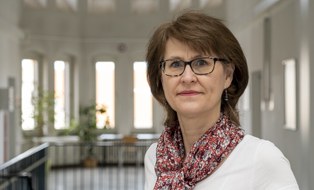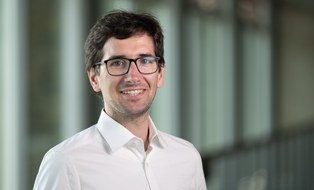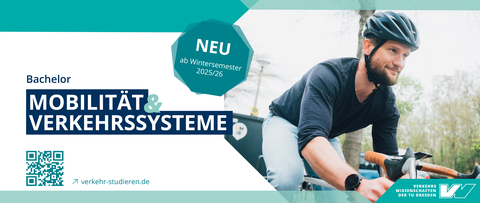Transition 2025
The study documents (examination regulations and study regulations incl. study plan and module descriptions) in Transport Engineering will be updated again on 01.10.2025. Most students will have to transfer to the new study regulations. In addition, the diploma course will be converted to Bachelor's and Master's degrees. All important details are described on this page.
An information event on the transition to the new study regulations took place on 14.07.2025.
Table of contents
Why are there changes again?
The study regulations, which came into force in 2022, contain an undesirable circumstance: all grades in the degree program are included in the calculation of the overall grade, including those of the foundation course. This is to be eliminated with a new amendment from 01.10.2025.
In addition, it has now been decided that the Diplom degree course in Transport Engineering will be converted to Bachelor's and Master's degrees. The diploma course is gradually being phased out, while from 01.10.2025, students will only be able to enrol on the new Bachelor's degree course in Mobility and Transport Systems.
What exactly will change?
Compared to the regulations from 2022, only two things will change: the calculation of the overall grade will be corrected and the main study program will be adjusted. This means that all students who are enrolled on the Transport Engineering degree course can still complete it as normal.
The following changes have been made:
- The overall grade for the degree program, which is shown on the transcript, is now once again made up of the main course of study only. The grades from the foundation course are not included in the calculation of the overall grade, as was the case before 2022.
- The curricula of the main study program will be updated: Whereas previously most modules in the major field of study were compulsory and only a few modules could be chosen, the major field of study will be much more flexible:
- There are now only three compulsory modules per field of study: Professional internship, main seminar and student research project. These must still be completed. Of course, the dissertation must also be completed towards the end of the course.
- There is a large compulsory elective area in each field of study. This includes modules worth 85 credit points, from which only 70 credit points must be chosen. This means that not all modules in the field of study have to be completed, but a few modules can be omitted.
- The general compulsory elective area is significantly larger: modules worth a further 45 credit points must be selected from this area. This includes modules from the compulsory elective area of the field of study that have not yet been taken.
- The main study program is therefore much more flexible: there is greater freedom of choice, so that students can study more according to their individual interests.
At the same time, many modules will be changed or completely replaced over time as soon as the new Bachelor's and Master's degree courses start. This will ensure that all diploma students can continue their studies at the same time, but also that new courses can be offered for the new degree programs. - The modules of the basic study program will not change: all modules remain compulsory and must be successfully completed in order to graduate from the diploma program. However, these modules will be gradually changed. If you need to retake or repeat these modules, please note the information on the changeover.
- In the course of the change, a few modules will be updated.
Studienordnung für den Diplomstudiengang Verkehrsingenieurwesen
Prüfungsordnung für den Diplomstudiengang Verkehrsingenieurwesen
Who has to transfer and when?
Basically, the following applies:
- Anyone still studying under the old regulations from 2013 or earlier will automatically transfer to the 2022 regulations on 01.10.2025 and can remain in them until 30.09.2026 at the latest.
Only students who have already completed all the modules required for their studies and registered their thesis on 30.09.2025 can apply to remain in the old regulations until they complete their studies.
Transferring directly to the 2025 regulations on 01.10.2025 is possible and recommended. An application for transfer must be submitted for this. - Students who are already or will be studying under the 2022 regulations can voluntarily transfer to the completely new 2025 regulations on 01.10.2025 or 01.04.2026.
- From 01.10.2026, the new regulations from 2025 will apply to all students . Students who are not yet studying under these regulations will automatically transfer.
- Due to the introduction of the Bachelor's degree program in Mobility and Transport Systems, the courses in the foundation degree program will gradually be phased out. They will be offered in full for the last time for the 2024 enrolment year in accordance with the study schedule. If you need to repeat or repeat modules, please note the information on the changeover.
- The courses in the main study program will be gradually converted together with the corresponding modules. This means that old modules may be dropped and replaced by new modules. If a module would have had to be made up for, the new module can be studied instead or another module can be selected.
- Transferring can result in a number of advantages. To minimize disadvantages, we recommend an individual examination. Please note that the transfer rules have changed compared to the transfer from 2013 to 2022.
Whether you should or must transfer depends on your enrollment and actual study progress. We recommend the following:
- We generally recommend that most students transfer to the new 2025 regulations on 01.10.2025, as these regulations have clear advantages over the previous versions. The following three cases are exceptions:
- Students in the 2013 or earlier regulations who have completed all modules by 30.09.2025 and have registered the dissertation as their final achievement are recommended to remain in their previous regulations. An application to the Examination Office is required for this.
- For the 2024 enrolment cohort and students on the 2022 degree program who have not yet fully completed their basic studies, we recommend remaining on the current degree program for the time being and transferring at a later date. However, if a third attempt in Mathematics 1 is due in the next semester, a transfer should be considered because the previous examination attempts will be reset to zero upon transfer.
- Students who have successfully passed examinations in a module at the time of transfer but have not yet completed the entire module should remain in the old regulations if the examinations they have already passed cannot be credited in the new regulations.
How does the transfer work?
Previously completed coursework and examinations can be transferred on the basis of equivalence tables. The rules have changed compared to the transfer to the 2022 regulations. The following applies:
- After the transfer, the requirements of the new examination regulations from 2025 apply, which means that a new check must be made as to which and how many modules still need to be studied before the degree course ends. You can do this yourself in advance without obligation using the interactive Excel table (2013-2025) or interactive Excel table (2022-2025).
- The equivalence table 2013-2025 or the equivalence table 2022-2025 determines which new module is credited for which old module and which individual examination achievements are transferred, if applicable. Decisions are made in three categories:
- Identical modules: Identical modules must be continued. If a module is passed, it is transferred. Failed module examinations and individual failed examinations (failed attempts) are also transferred. It is not possible to "restart" the module.
When transferring from the 2013 regulations, there are only a few identical modules. When transferring from 2022 to 2025, most modules are identical modules. - Non-identical modules with identical module examinations: If the old module only contains one examination, the same applies as for identical modules: they are updated, even if you have already failed the examination. If the module contains several examinations, failed examinations are not carried over unless the module itself has already been failed.
Only a few modules are affected by this. - Non-identical modules with non-identical module examinations:
These modules are automatically transferred if they have been passed. If individual examinations have already been passed, these examinations are also automatically transferred if there is an equivalent examination in the new module. The equivalence table lists which examinations exist and whether an examination achievement has an equivalent examination achievement.
This is the most common case when transferring from 2013 to 2025. When transferring from 2022 to 2025, there are only a few modules with this rule.
- Identical modules: Identical modules must be continued. If a module is passed, it is transferred. Failed module examinations and individual failed examinations (failed attempts) are also transferred. It is not possible to "restart" the module.
- If modules from the old regulations do not (or no longer) exist in the new regulations, the old modules passed will be structurally credited, i.e. transferred as an independent module. They will be credited in the compulsory elective area in which they were previously located.
- Failed attempts at examinations are only forfeited if the module is not identical and the examination is not identical. After transfer, the new examinations must be completed, starting with the first attempt - i.e. three attempts after transfer.
- It is not possible to transfer modules or examinations that have already been passed and take them again later.
- Compared to transferring to the 2022 regulations, no compulsory modules are added when transferring from 2022 to 2025. This means that no work has to be made up after transferring.
- Previously completed additional coursework that goes beyond the scope of the Transport Engineering degree program can be applied for again as additional coursework after the transfer.
What do I have to do?
For a transfer up to and including 01.04.2026, an application must be actively submitted to the Examination Office. If no transfer has taken place by then, an automatic transfer will take place on 01.10.2026.
Please fill out the application form for transfer, sign it by hand and submit it to the Examination Office with the printout of the grade overview from HISQIS or SELMA.
Important documents
- Set of slides from the information event on 14.07.2025
... summarizes the background and details of the transfer. - Equivalency table 2013-2025
... lists which old modules can be credited for new modules for the transfer from 2013 to 2025. - Equivalency table 2022-2025
... lists which old modules can be credited for new modules when transferring from 2022 to 2025. - interactive Excel table for the transfer 2013-2025*
interactive Excel table for the transfer 2022-2025*
... shows which modules have been taken and can help you to see which modules still need to be taken*. - Application form for transfer
... must be submitted to the Examination Office to initiate the transfer. - Application to remain in the 2013 study regulations
... must be submitted informally by e-mail or post in order to remain in the old regulations if modules have been completed and a thesis has been started. - Studienordnung für den Diplomstudiengang Verkehrsingenieurwesen
Prüfungsordnung für den Diplomstudiengang Verkehrsingenieurwesen
*) No guarantee can be given for correctness. In case of doubt, the information in the equivalence table applies.
What happens when you switch to Bachelor's and Master's degrees?
The Faculty has decided to phase out the Diploma degree course in Transport Engineering and replace it with the Bachelor's degree course in Mobility and Transport Systems and other Master's degree courses.
All students enrolled in Transport Engineering can complete their studies according to the current rules. However, it should be noted that the courses of the basic study program will be phased out and the modules of the main study program will gradually be adapted to the new study structure.
Specifically, the following applies:
- The 2024 enrolment cohort is the last to be enrolled on the Transport Engineering degree course. From 2025, students will only be enrolled on the Bachelor's degree course in Mobility and Transportation Systems.
- The courses of the foundation degree program will be gradually phased out so that the 2024 enrolment cohort can still attend them in accordance with the study schedule. If necessary, examinations will be offered to students who wish to continue or repeat their studies until further notice. The courses can no longer be offered, but there are compensation options:
- for some modules, courses from the Bachelor's degree program Mobility and Transport Systems can be attended,
- for some modules, courses from other degree programs can be taken,
- for some modules, documents for self-study, such as video material, will continue to be provided.
- For some modules, it is possible to hold consultations with the teaching staff.
- An overview of how modules can be retaken or repeated can be found below.
- Modules are offered for the main course of study until further notice, so that the course can be completed over a longer period of time. Modules are adjusted regularly: Modules have to be updated or postponed in the semester, and some modules will no longer be offered. To compensate for discontinued courses, new modules are added to the Master's degree programs. If compulsory elective modules are no longer offered, it is not possible to repeat or catch up on them. In this case, another module must be selected.
Overview of discontinued modules in the foundation course
| Last regular offer | winter semester 2024/2025 |
|
Substitute offers after the end of the courses |
|
| Contact person | Prof. Gunar Matthies |
| Last regular offer | summer semester 2025 |
|
Substitute offers after the end of the courses |
|
| Contact person | Prof. Gunar Matthies |
| Last regular offer | winter semester 2025/2026 |
|
Substitute offers after the end of the courses |
|
| Contact person | Dr. John Martinovic |
The courses will continue to be offered unchanged.
The courses will continue to be offered unchanged.
| Last regular offer | winter semester 2025/2026 |
|
Substitute offers after the end of the courses |
|
| Contact person | Lydia Harnisch |
| Last regular offer | winter semester 2025/2026 |
|
Substitute offers after the end of the courses |
|
| Contact person | Paul Schwarzbach |
| Last regular offer | summer semester 2026 |
|
Replacement offers after the end of the courses |
|
| Contact person | Dr. Angelika Hirrle |
| Last regular offer | winter semester 2024/2025 |
|
Substitute offers after the end of the courses |
|
| Contact person |
Dr. Sven Hietzschold |
| Last regular offer | winter semester 2025/2026 |
|
Substitute offers after the end of the courses |
|
| Contact person | Daniel Lubig Marco Berger |
| Last regular offer | winter semester 2024/2025 |
|
Substitute offers after the end of the courses |
|
| Contact person | Dr. Jan Eisold (course content) Dr. Beate Lux (laboratory practicals) |
| Last regular offer | winter semester 2024/2025 |
|
Substitute offers after the end of the courses |
|
| Contact person | Martin Sommer |
| Last regular offer | summer semester 2026 |
|
Substitute offers after the end of the courses |
|
| Contact person | Dr. Jens Opitz |
| Last regular offer | summer semester 2025 |
|
Substitute offers after the end of the courses |
|
| Contact person | Johanna Böhm (part road design) PD Dr. Rico Wittwer (part spatial and traffic planning) Elke Clarus (Environment and traffic section) |
| Last regular offer | winter semester 2024/2025 |
|
Substitute offers after the end of the courses |
|
| Contact person | Prof. Georg Hirte |
| Last regular offer | winter semester 2025/2026 |
|
Substitute offers after the end of the courses |
|
| Contact person | Dr. Jens Opitz |
| Last regular offer | summer semester 2026 |
|
Substitute courses after the end of the courses |
|
| Contact persons | Dr. Volker Quarz (part traffic machine technology) Dr. Sven Hietzschold (representation part) Tobias Bregulla (driving dynamics part) |
Until further notice, general EBW language courses (without a focus on transport English) can be taken.
Alternatively, VW-MOVE-152 English C1 for Transport Studies can also be taken.
Frequently asked questions
The application for transfer must be submitted to the Examination Office by 27.09.2025 for the winter semester or by 27.03.2026 for the summer semester in order to be considered. Applications received after this date can generally only be considered for the following semester.
Please proceed as follows:
- Fill out the application for transfer, print it out and sign it by hand.
(A digital signature is not valid on this application). - Attach a printout of the grade overview from HISQIS or SELMA.
- Send the application for transfer and printout of the grade overview to the Examination Office:
- by dropping it in the mailbox of the Examination Office or
- by post to the Examination Office or
- by handing it in at the Examination Office.
Please note that the application must be received by the Examination Office by 27.09. before the winter semester or by 27.03. before the summer semester.
In the coming semesters, examiners are increasingly required to announce examination results in good time before the transfer deadlines.
However, if examinations have not yet been announced for transfer, they will be transferred to the new degree program after they have been announced.
For legal reasons, it is not possible to attach conditions to the transfer or the transfer of credits. This means that a clear decision on transfer and the transfer of credits must be made even if examination results are not yet available. Please contact the examiners in good time to request a quick correction.
Students who are currently writing their dissertation can still transfer. The period and deadline for submitting the coursework do not change. Once the coursework has been completed, the grade and credit points are automatically recorded.
The transfer does not change the composition of the foundation course. This means that everyone will still receive their intermediate diploma after transferring, once all requirements have been met.
In the foundation course: Examinations are still offered for the module if required. For self-study materials, please contact the relevant lecturer. If necessary, courses from another degree program can be attended as a substitute.
In the main study program: please choose another compulsory elective module.
Yes, it is also possible to transfer to the Bachelor's degree course in Mobility and Transport Systems. Because the degree program will only be established in stages from winter semester 2025/2026, only the courses of the first and second semesters will initially take place. It is therefore only advisable to transfer if there is still a lot of catching up to do in the first semester.
Courses already completed on the Diploma degree course in Transport Engineering may also be credited towards the Bachelor's degree course in Mobility and Transport Systems (e.g. Mathematics 1 and 2 and some transport modules). An application must be submitted to the Examination Committee for this.
Completed modules that are no longer offered in the new regulations will also be transferred and structurally credited in the new regulations. In most cases, this happens automatically because they are listed in the table of equivalences in the last section. Modules that are missing there and have not been completed by the time of transfer are credited manually after the transfer.
In the case of structural crediting, compulsory elective modules are transferred to the compulsory elective area in which they were previously included:
| VIW 2013 / VIW 2022 | VIW 2025 |
|---|---|
| Compulsory module of the field of study | Compulsory elective module in the field of study |
| Compulsory elective module in the field of study | Compulsory elective module of the degree program |
| Compulsory elective module of the degree program | Compulsory elective module of the degree program |
Partially yes:
- Compulsory elective modules of the field of study can also be used as compulsory elective modules of the degree program.
- Compulsory elective modules of the degree program cannot be used as compulsory elective modules of the field of study (if they are not also assigned as compulsory elective modules of the degree program in the module description and curriculum).
When entering in the Excel table:
When transferring, the following picture often appears in the interactive Excel table:
In this case, all conditions are met: 15 LP "too many" have been completed in the field of study. However, these can be transferred to the "LP free elective" area.
Exactly which modules are to be moved there must be determined at the beginning of the degree program during the account clarification at the Examination Office. The modules will then be listed on the certificate in the respective compulsory elective area.
The free attempt rule applies to both the old and the new study regulations.
Obtaining a free attempt
In order to receive a free attempt, an examination must be taken before the date specified in the study plan. The study plan in which you are currently studying is always decisive. Transferring to the new degree program does not lead to an (additional) free attempt for an examination taken in the old degree program if it was not taken "too early" at that time.
Using a free attempt
An existing free attempt can be transferred to the new regulations. This means that anyone who took an examination "too early" in the old regulations can also use this free attempt after the transfer, provided that the same examination is also available in the new regulations.
Who can I contact?
Ms. Katrin Lindner and Mr. Konstantin Thieme will advise you on the topic of transfer. Please make an appointment in advance by e-mail and bring your transcript of records (HISQIS or SELMA extract) with you.
 © Privat
© Privat
Mrs Katrin Lindner, Examination office
Send encrypted email via the SecureMail portal (for TUD external users only).
Visiting address:
Hülße-Bau, Nordflügel, 1. Etage, Raum N109 Helmholtzstraße 10
01069 Dresden
Postal address:
TUD Dresden University of Technology Fakultät Verkehrswissenschaften "Friedrich List", Prüfungsamt
01062 Dresden
Students should use the contact form instead of the email address: https://tu-dresden.de/bu/studium/im-studium/kontakt/vw
Office hours:
- Tuesday:
- 09:30 - 11:00
- 13:00 - 17:30
- Thursday:
- 09:00 - 11:00
- 13:00 - 15:00
During the semester break on Tuesday morning and Thursday afternoon the office is closed! Recent changes see at News on the Examination Office website
 © Sven Ellger | TUD
© Sven Ellger | TUD
Programm-Manager
NameMr Dipl.-Ing. Konstantin Thieme
Send encrypted email via the SecureMail portal (for TUD external users only).
Dean's Office "Friedrich List" Faculty of Transport and Traffic Sciences
Dean's Office "Friedrich List" Faculty of Transport and Traffic Sciences
Postal address:
TUD Dresden University of Technology "Friedrich List" Faculty of Transport and Traffic Sciences
01062 Dresden
Parcel address:
TUD Dresden University of Technology "Friedrich List" Faculty of Transport and Traffic Sciences Helmholtzstraße 10
01069 Dresden
Visiting address:
Gerhart-Potthoff-Bau, 155 Hettnerstr. 3
01069 Dresden






